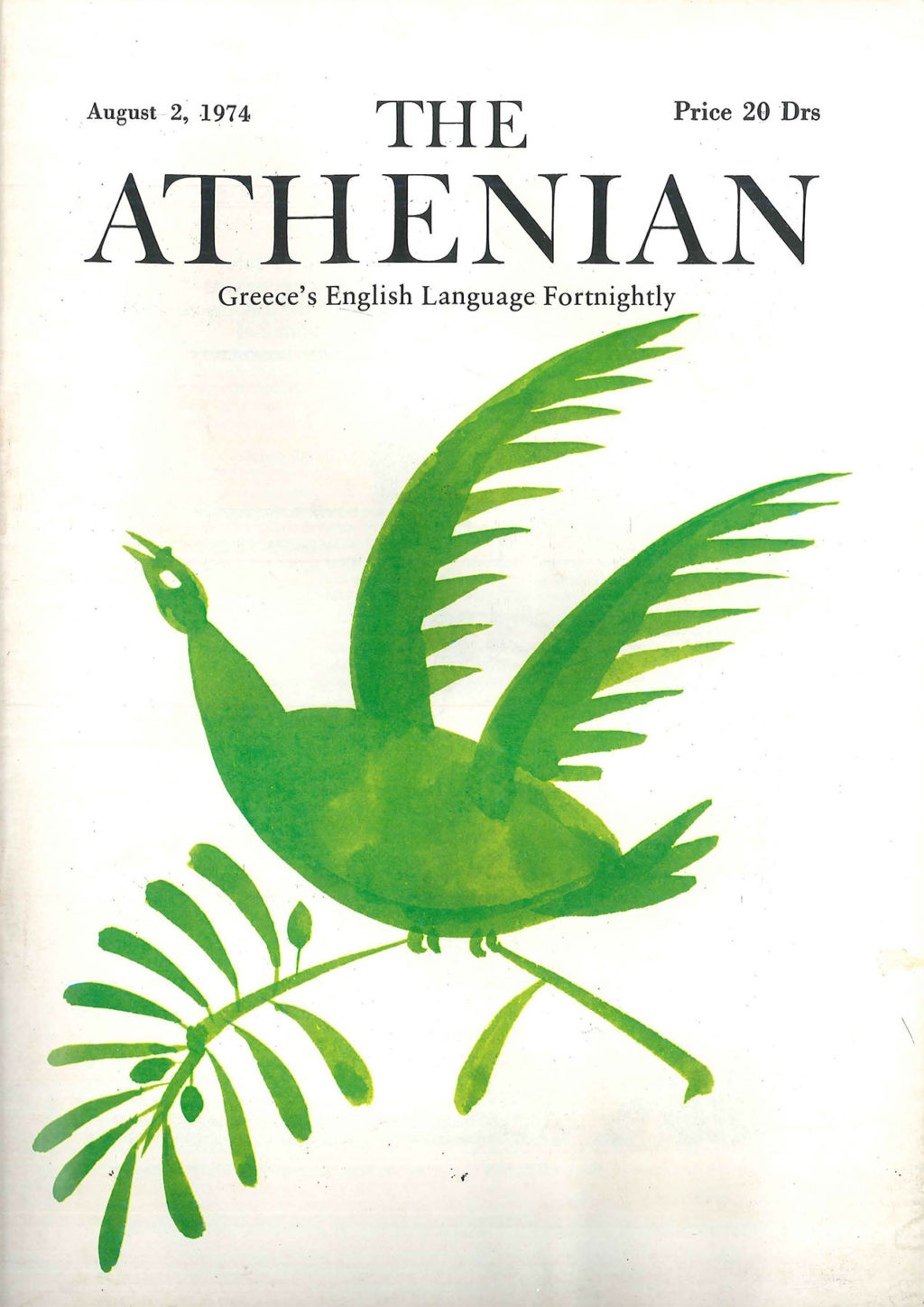
It was the worst of times. They arrived under the cloak of darkness and at first no one believed that their regime could last. After all, a dictatorship appearing in Europe at that time was a preposterous anachronism. True, there was one in Spain and another in Portugal, but they had been there a long time and everyone hoped they would soon go away. Europe, it was said, would not tolerate it. It was up to Greeks, argued others. But what do you do in the face of guns and tanks?
So the protests began and continued and martyrs arose from amongst those who could afford martyrdom. Ordinary protesters remain anonymous: quickly out of the way and nullified, hence, not martyrs at all. The majority of those who suffered will remain unknown and will not warrant so much as a footnote in history. Which is not to say that we are not grateful for the stance and the bravery shown by those well-known enough to attract public acknowledgment.
Most of the population over the seven years simply grew quieter and more inward-looking… like autistic children whose spiritual development is stymied. Often mute, preferring silence and withdrawal to being wounded … once again … and giving vent to only the occasional burst of fragmented and misplaced rage.
It was a time of warning. Be careful what you say, be careful what you write, nothing is safe, no one is to be trusted. ‘ … banality over the phone became a habit…’ wrote Kevin Andrews. Banality, in fact, became a way of life.
We were denied the ‘renewal’ that comes from the young and warned our children to curb their youthful thoughts, their tendency to question, their playful sacrilegiousness. (On October 28 we say, ‘Oxi,’ my child, but it is not a good joke to shout ‘nai’ when we are having a plebiscite – we may get into trouble).
Most ludicrous of all, the children in the end, became the enemy. (A fourteen year old stands in the doorway of his home in November waiting for his dog to return from its walk. His appearance is enough to attract a squad of soldiers and policemen. The father descends and gives explanations and produces identity and the young boy is allowed to return to his home with his dog. The pity of it is that the soldiers and policemen are themselves young … and probably just as afraid).
It must be said. Too many visitors or foreign residents in Greece displayed what can be described at best as bad manners, at worst as obtuse cruelty. Removed from the hazards, the dangers, the fears, the threats, the indescribably irrational stupidity of it all, they enjoyed the luxury of expounding their views, often insisting on the ‘expediency’ of the situation. Their listeners who had to live the reality of dictatorship sat muzzled, their answers, their frustrations, their thoughts, stuck in their throats choking them.
And so it continued. We lived in a vacuum that threatened never to be released – unable to escape, except by tuning out completely, from the numbing effects of the bombardment of shibboleths, of meaningless platitudes, the warmed-over slogans abstracted from the past. What, after all, does Greece, Greek and Christian mean? Is it a redundancy? Words put together in random fashion because they sound good? Surely we do not need to be told that Greece is Greek ‘and that it is a Christian state? Did they believe they had cornered the market on righteousness, that they had exclusive claims to being Greeks? Their presumptuousness was staggering.
And so it continued, until suddenly it all ended. On the night of July 23rd the word began to spread and small knots of people collected outside the Parliament Building, hesitantly, then jubilantly. Walking along Vassilisis Sophias we snapped pictures of the smiling faces including those of two approaching policemen who instinctively lunged for our camera and then checked themselves.
At first there were tense moments. Young policemen in a bus drove by looking out with soberness and, perhaps, fear at the crowds surrounding them. The crowds stared back. A few minutes later they began to cheer and to raise their fingers in the victory sign. A young policeman popped his head out of the window of the bus and, smiling, returned the gesture. The tension was over, and the jubilation spread to the boys in the vehicle. So much happened so rapidly in those days before that Tuesday when the military government, whose symbol was a phoenix rising from its ashes, went down to the ironic accompaniment of forest fires, while the rumours spread as rapidly as the flames. But let us go back …
Attic Fires
The streets of Athens smelled of burning pine and heavy clouds of smoke rolled across the sky. Ashes fell in the heart of the city and the sun’s calor turned a dark and eerie orange.
The series of fires that had broken out in various parts of Attica were the worst in fifty-eight years. The most destructive began between the mountains of Pendeli and Parnes. Driven down by a strong wind from the north, it threatened the village of Krioneri, approached the military camp at Boyati, and cut a wide swath through the former Royal Park at Tatoi before it was arrested at Varibobi. Units of the army and the gendarmerie fought the fire for two days. Meanwhile two fire-fighting planes strove to dampen down theflames with water from Lake Marathon.
The same afternoon a fire broke out on the other side of Mount Pendeli and had come close to Pikermi before being extinguished. A third fire, meanwhile, had started farther north, near Varnavas. Moving towards Grammatiko at one point it spread along a front over six kilometres in width. The fourth and last fire of that same day near Anavyssos was the rekindling of one that two days earlier had started up outside of Saronis. In the face of such vast destruction, it seemed absurd to warn drivers and picnickers once again about the careless disposal of cigarettes… the chief cause of these tragic conflagrations.
The fires that spread through the streets of Athens a week later were to be a far different sort and their cause anything but careless. ‘The streets are abloom with delightful feasting and the hymns of children go up like a flame,’ was how Bacchylides put it twenty-five hundred years ago.
Mobilization
28 October 1940. 20 July 1974. After thirty-four years, Athens relived that fever called General Mobilization. Those who remember the earlier date know what it is about, but for younger people it has been a new experience. One moment one was at work or on a beach, and several hours later at a mobilization centre being issued a gun and a knapsack.
It was eleven o’clock Saturday morning when TV and radio first announced the mobilization. Thousands of vacationers involved in the decree were on far-away beaches and it was long time before they heard the news.
A hotel manager near Porto Heli, hearing the news, wondered how to inform his clients who were scattered along the beaches. So he sent a clerk out on water-skis. Passing close to the shore, the clerk shouted the information through a megaphone. Those involved by the call-up returned, packed up their suitcases, emptied the hotels, and took away with them in their cars most of the hotel personnel as well. Only foreign tourists remained to keep company with the Sudanese waiters and cooks.
A hundred brides-to-be were left in a pitiable state surrounded by heaps of unopened bonbonnieres, while the bridegrooms, on what was supposed to be their wedding night, tried to sleep in freight cars going to Kilkis and Kastoria.
Meanwhile a picturesque line of horse-and-buggies came down from Kifissia to the center of Athens to help in the transportation crisis. Generally these carriages are used by people in love, but in the absence of most men between 20 and 40, the carriage-courting business in Kifissia was unusually slow.
Military service seemed to have drafted enough specialists in most fields but for hair-cutting. So many longhaired and bearded soldiers turned up that there were not enough barbers to take care of all of them.
A well-known shipowner, on hearing the first martial music and demotic songs, decided that Greece was no longer good for business. He gathered his near and dear (whose dear was always near), went down to his yacht, and gave orders to his captain. He did not get far, however. The crew, having heard of the mobilization were filled with a spirit of patriotism and forced the captain back to Tourkolimano.
Three Kifissia carpenters riding on one motorcycle towards Volos to report for military duty found the National Road closed. A section of it had been turned into a temporary air-strip. Undaunted, the carpenters spent the next four hours bouncing over fields and olive groves. Aftei ten hours they finally reached Volos, normally a three hour trip. Reporting to their senior officer, they were told to prepare to march on Constantinople. ‘Well,’ said Takis, one of the three, ‘at the rate of progress we have made so far, we won’t get there until the 21st century.
In downtown Athens offices and stores emptied out. In Kolonaki we saw a large group of men emerging from a bank—each holding a shopping bag— in a hurry and visibly excited. For a moment we wondered if there had been a hold-up, but through the window we could see the manager and a weeping female clerk.
In another office an executive watched the sad scene as the young men on his staff departed while the cleaning women and secretaries stood by waving handkerchiefs and crying. He had worked for years to bring young blood into his staff but it was not until that moment that he realized the extent to which he had succeeded. He was left behind with one manager, the secretaries, and the cleaning women: out of a staff of 35, twenty were called up.
On the Saturday night, the railway stations and bus depots were still crowded with men clutching their plastic shopping bags. In a moment of crisis one seizes whatever is at hand and uses the most readily available ‘luggage.’ The trains screeched into the depots and more men climbed aboard.
At Ellinikon we were stopped. The airport, it was explained, was closed. We drove back to the city through the eerie silence, the airports that normally dominate that part of the seashore looming dark and strange in the background.
For most of those just over forty, the sudden mobilization was a moment of truth: the last seven years have been endless — and therefore timeless. When they saw the younger men go, piling into buses and trucks, shouting and waving flags, the fact that they were not called and were left behind was a shock of recognition. Dictatorship — among more obviously bad things — is a terrible waster of time.
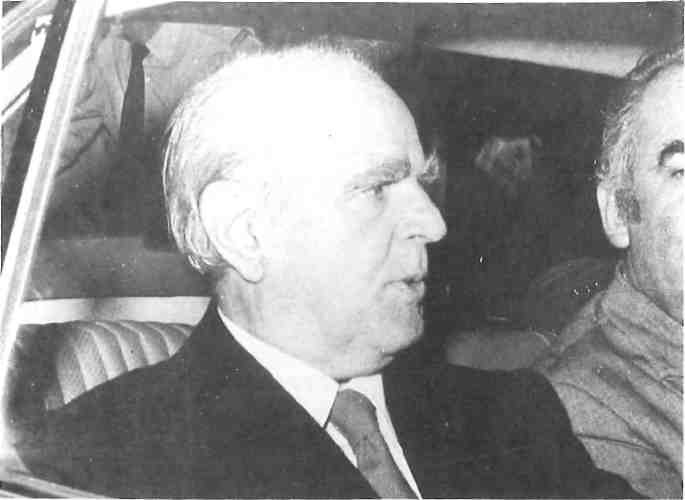
The Night of the Twenty-third
We were reminded of the Homeric epithet ‘fleet-footed Rumour.’ There were rumblings about the Third Army in the North, the imminent arrival of the King, of Karamanlis, of a government of national unity. We had heard the rumours before.
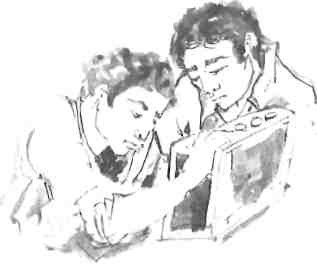
In grim attendance stood the spectre of November — which had left us shocked and blank-eyed, with emotion and gas induced tears streaming down cheeks and the memory of frantic, wild running feet, running nowhere. We waited, as we had for so long, by the radio.
The rhythmic honking of car horns and the distant undertone of chants drew us away from work and, going down to Vas. Sophias, we joined the stream of people heading for the side entrance to the Parliament Building.
Democratia….Zeto ο Makarios…. OH enomenoi (all united)…. The chants rose and spread through the crowd. We worked our way through the expectant faces — students in T-shirts and jeans, office workers in dresses or shirtsleeves, labourers shirtless and sandalled, professionals in suits, reporters and cameramen, and the bewildered tourists. On the fringes of the mass, smaller groups hovered about radios or stood speculating on what it all meant. A labourer clutching his girl, grabbed us by the arm — ‘He’s coming… at 8:30… Karamanlis is coming…’
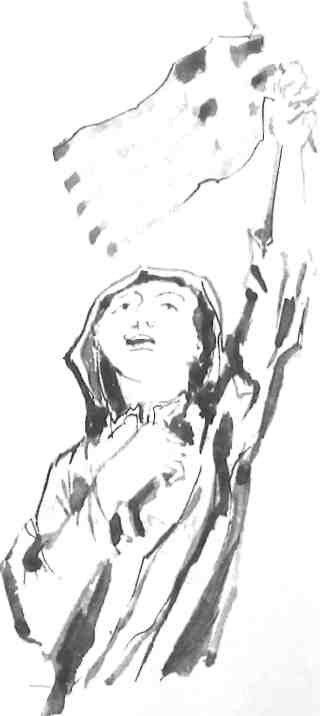
In the middle of the Boulevard, lines of policemen tried vainly to keep people out of the paths of cars and trolleys which continued to move, their horns blaring and their passengers exchanging the ‘V sign with the crowds.
No one seemed to know what was going on inside the Old Palace. The politicians arrived — Averoff, Mavros, Kanellopoulos, Stefanopoulos, Markezinis, Zolotas, Garoufalias — the implications of their presence overshadowed by the one overwhelming fact: after seven years, the people were once again in the streets, speaking out.
Psomi, paedia, eleftheria (bread, education, freedom)… psomi, paedia, eleftheria… the slogans rose; pictures of Makarios, wreathed with olive branches; and flags, flags everywhere. One flag bearer jumped on the roof of a passing car and balanced himself precariously as he smiled broadly at the cheering crowd.
On the fringes, small groups held quiet discussions or listened to news from a situation that kept everyone sober — Cyprus. We eavesdropped on conversations, wandering from one knot of people to another. In one of these knots, a diminutive fellow of about 45 was taking on all comers. The words and tone were of moderation, the same kind of moderation that seemed to be expressed by the restraint of the crowd.
A dishevelled policeman flopped down on the curb beside us. With a few choice epithets he complained about his tired feet and proceeded to unwrap a sesame cake that he had bought at a kiosk. He offered us a piece and gobbled up the rest. We asked him if he’d been on his feet since the morning. ‘Since this morning? Since last Tuesday.’
(Inside George Mavros had assumed responsibility for foreign affairs in the new government and was on the phone to Glafkos Clerides, the acting President of Cyprus.)

If the predominant mood of the afternoon and evening had been relief and a subdued exuberance, a deeper calm prevailed in the evening — a sense that the change had to be seen through, that until Karamanlis arrived, no one would believe it.
A newspaper hawker passed us and moments later what he was shouting sank in: Vradyni, Vradyni… the first written proof of change.
Inside the Grande Bretagne a television news report announced that the new Prime Minister, Karamanlis, had arrived and was in fact already asleep. The crowds grew increasingly restive, rushing out into the boulevard at the sound of a siren or the approach of a police car.
At about 2:30, a patrol car with its blue light flashing came down Vas. Amalias and the crowd surged forward. Several more police cars passed, followed by a black Mercedes. The convoy turned up Vas. Sophias and entered the Parliament grounds. Streams of cars with horns blowing had followed them from the airport. Karamanlis, after an absence of eleven years, had returned. So much for the newscast.
Before the gates of the Polytechnion, re-erected and showing little evidence of the tank tracks that had crumbled them in November, a crowd gathered and silence fell. Fresh chants broke out, the third stanza of the national anthem was sung.
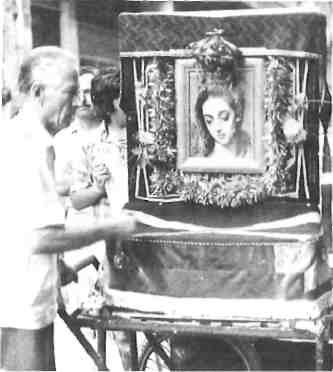
At the Grande Bretagne the weary policemen kept themselves awake playing football on the sidewalk with an abandonned sandal.
Inside the lobby, bell-hops and maitres rushed about preparing for the arrival. At 5:00 a.m. a smartly dressed bodyguard entered the hotel, the owner hustled down the steps, and a number of police chiefs snapped to attention. A tall, well-groomed gentleman, the famous black eyebrows now as white as ostrich feathers, bustled into the half-empty lobby followed by several photographers and reporters. Thrusting aside a microphone and resisting the attempts of one of the maitre’s to embrace him, Costas Karamanlis nodded to those gathered around, moved swiftly to the elevator, and was swallowed up.
A false dawn was growing on building fronts and across the top of Hymettus in the distance, as we made our way home.
Homecoming
Down the street our organ-grinder was standing motionless next to his laterna, its El Greco-like lady gazing modestly out from under the carnival decorations.
Gradually a small group of people gathered in front of a Kolonaki apartment building. A car pulled up and out came Angelos Antonopoulos of theatre and television (Agnostos Polemos) fame. He walked toward the building and took his place among the cluster of people. Heads bobbed out of windows, figures appeared on balconies. Nonika Galinea and Alexandrakis, two more theatrical personalities, arrived and took their places nearby. Finally a limousine drew up and the organ grinder cranked out the theme song from Never on Sunday.
The door of the limousine opened and an elderly, white-haired gentleman emerged to be immediately embraced by several of those who waited. Jules Dassin? After a suitable pause, Melina Mercouri herself leapt out, made her way over to the laterna and began to turn the crank, laughing all the while and blowing kisses. A few emotional embraces, some applause from the by-standers and she disappeared into the building. Melina Mercouri was home again. All over Athens similar scenes were occurring. Ellinikon airport was a busy place. Greece’s ambassador to Turkey, Dimitris Cozmadopoulos, who had submitted his resignation during the recent crisis, arrived on the heels of Amalia Fleming. His had been a circuitous route via Syria. A few hours later he was back on a plane, off to resume his post as Greece’s representative in Ankara.
News of arrivals whizzed around the city: Mangakis is back. Theodorakis may give a concert in a few days. Where is Helen Vlachou?

And so the exiles returned. What will their reactions be after so many years of absence, we wondered? Will they see many changes? In some areas Greece has made much progress and suffered the changes that are inevitable to economic development. The standard of living of the average citizen and their expectations have improved… a phenomenon apart from recent government policies and more likely the harvest of those of their predecessors. Television has penetrated the countryside and together with increased mobility, drawn the far-flung peasantry into the world of the cities.
Will these exiles be stunned by the cost of living? Will they be saddened by the disappearance of the famous fruit and vegetables — sweet, perfumed, untampered with by modern methods? They will have many adjustments to make just as those of us who have spent the years of the junta here must adjust to a new image of the country now that the many dimensions and colours of its personalities have been restored. Sometimes exasperating, often delighting — it’s nice to have them all back.
The Order Changes
A well-known lady of Patmos, hearing that the military government was abdicating in favor of a political one, got out hammer and chisel and started removing the emblem of the 21st April. Apprehended by a policeman, she was taken to the local precinct. “We have no orders yet,” she was told, “for the taking down of these signs, and when we do, Madam, we will not be in need of your help.”
A celebrated writer has suggested that the 21st April be scratched from the calendar. In the spirit of the old hotels where Room 13 was omitted, substituting 12A between 12 and 14, he believes that of the last week of April should begin as April 20, April 20A, April 22…

